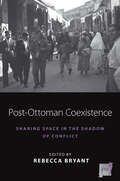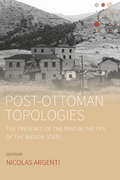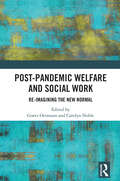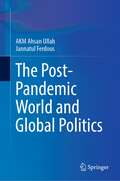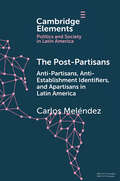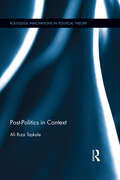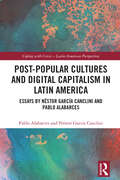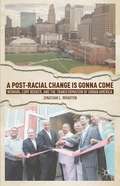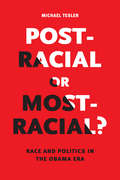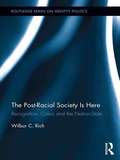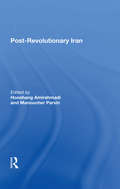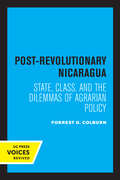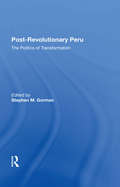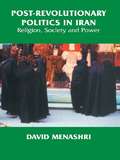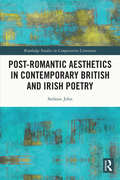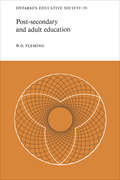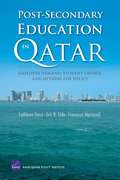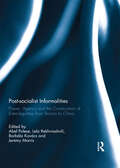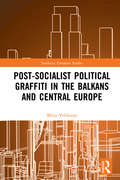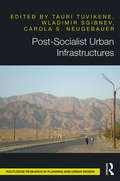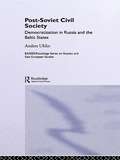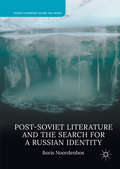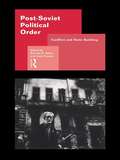- Table View
- List View
Post-Ottoman Coexistence: Sharing Space in the Shadow of Conflict (Space and Place #16)
by Rebecca BryantIn Southeast Europe, the Balkans, and Middle East, scholars often refer to the "peaceful coexistence" of various religious and ethnic groups under the Ottoman Empire before ethnonationalist conflicts dissolved that shared space and created legacies of division. Post-Ottoman Coexistence interrogates ways of living together and asks what practices enabled centuries of cooperation and sharing, as well as how and when such sharing was disrupted. Contributors discuss both historical and contemporary practices of coexistence within the context of ethno-national conflict and its aftermath.
Post-Ottoman Topologies: The Presence of the Past in the Era of the Nation-State (Studies in Social Analysis #8)
by Nicolas ArgentiHow does an ethnically and culturally plural empire, where Christians, Jews, and Muslims could ascend to the highest levels of political authority and influence, devolve into a disarray of nation-states defined by nationalist ideologies? With contributions from several of the Balkan countries that once were united under the aegis of the Ottoman Empire, this latest volume proposes new theoretical approaches to the experience and transmission of the past through time. Each contributor explores themes regarding the transmission of collective memories of post-Ottoman state formation and the malaise associated with a contemporary epoch that, echoing late modernity, we might term ‘late nationalism’.
Post-Pandemic Welfare and Social Work: Re-imagining the New Normal
by Goetz Ottmann Carolyn NobleThe COVID-19 pandemic represents a critical juncture in the development of the welfare state affirming its importance for its citizens’ economic, health and wellbeing, and safety especially for its most vulnerable populations. It demonstrated that the crisis preparedness that is crucial for an effective protection of its citizens, the ultimate purpose of the welfare state, unquestionably exceeds the narrow horizon of a corporatized welfare industry with its singular focus on the maximisation of profit for the elites and cost containment for the government. Social workers need to engage with the contradictions and tensions that spring from an underfunded welfare services and engage in the political struggle over a well-resourced welfare state. Contributors to this book take on this challenge. By tracing the various contradictions of the pandemic, the contributors reflect on new ways of thinking about welfare by exploring what to keep, what to challenge and what to change. By highlighting important challenges for a social justice-focused response as well as exploring the many challenges exposed by the pandemic facing social work for the coming decades, contributors critically outline pathways in social work that might contribute to the shaping of a less cruel and more capable welfare state. Using case-studies from Indigenous and non-Indigenous Australia, Italy, Slovenia, Estonia, Sweden, Spain, South Africa, Canada, Sri Lanka, Zimbabwe, China, and the US, the book features 19 chapters by leading experts. This book will be of interest to all social work scholars, students, and practitioners as well as those working in social policy and health more broadly.
The Post-Pandemic World and Global Politics
by A K Ullah Jannatul FerdousThe book examines the impact of COVID-19 on economic and political processes, contending that the global reaction to the pandemic has been the largest failure in scientific policy in a generation. Unlike earlier crises, it has impacted the world's leading economies while also paralyzing international ties, provoking diverse and far-reaching reactions. The authors posit that no effective global response has been launched in response to this global catastrophe. Rather, governments have implemented a variety of policies based on the costs of virus protection against financial closure and isolation. In doing so, there has been a resurgence in nationalism. This book aims to provide comprehensive understanding of how the pandemic has widened political gaps, and demarcates what the long-term consequences might be in terms of policies and economics in the wake of the pandemic. Of interest to scholars in political geography, development studies, international relations, public administration, and health science, this book presents key observations on existing theories of global politics pivoted around the COVID-19 pandemic, and its ramifications on individuals, groups, and ultimately, the nation state.
The Post-Partisans: Anti-Partisans, Anti-Establishment Identifiers, and Apartisans in Latin America (Elements in Politics and Society in Latin America)
by Carlos MeléndezWhere party identification is in decay or in flux, alternative political identifications have gained centrality. In this Element, the author develops a typology of post-partisan political identities: alternative ways in which rejection of or the absence of partisan politics are defining political identifiers or non-identifiers. Based on original evidence collected through opinion polls in different Latin American countries, as well as applying an innovative measurement, the author shows the respective magnitudes and ideological composition of anti-partisans (individuals who hold negative partisanships: strong identities based on predispositions against a specific political party or movement), anti-establishment identifiers (individuals who hold many negative partisanships simultaneously), and apartisans (individuals who lack any positive or negative partisanships). This Element demonstrates the usefulness of employing these categories in order to better understand different levels of party system institutionalization, party-building, and partisan polarization in the region.
Post-Politics in Context (Routledge Innovations in Political Theory)
by Ali Riza TaskaleAs disciplines, Politics and International Relations remain dominated by ideas drawn from traditions of liberal internationalism and political realism in which political imagination is preoccupied with command and order, rather than with disruption and emancipation. Yet, they have failed to offer adequate answers to why political action is foreclosed in contemporary times. Proposed through a historically informed engagement with seminal thinkers, including Walter Benjamin, Friedrich Nietzsche, Gilles Deleuze, and Michel Foucault, and examples from films and contemporary events, Ali Rıza Taşkale presents an original and much needed new perspective to interpret politics in our contemporary societies. He argues that post-politics is a counterrevolutionary logic which aims to create a society without conflict, struggle and radical systemic change. Post-Politics in Context serves as seminal intervention upon the debate over the depoliticised conditions of contemporary neoliberal society as well as functioning as an introduction to the core theoretical frameworks of alternative tradition of social and political thought in a manner that is lacking in current debates about Politics and International Relations.
Post-Popular Cultures and Digital Capitalism in Latin America: Essays by Néstor García Canclini and Pablo Alabarces (Coping with Crisis - Latin American Perspectives)
by Pablo Alabarces Néstor García CancliniIn this book, renowned Latin American intellectuals, Pablo Alabarces and Néstor García Canclini, bring us up to date on the changes in the status and role of the popular classes in Latin American democracies over the past two decades. Building on decades-long research and experience in the field of cultural studies, the authors ask how the digitalization and economization of society are changing the reality of political participation and social inequality in Latin America and beyond, leading to new forms of economic and cultural marginalization. García Canclini focuses on the rapid digitalization of our society and economies, ruminating over the future of political participation and democracy in the coming age of algorithms, transnationalization, and social precarity for growing swaths of the population. By contrast, Alabarces focuses on the disintegration and commodification of popular cultures throughout Latin America in the last two decades and discusses the consequences on democratic projects in the region. Both pieces approach the question of how democratic projects on a local, regional, national, and transnational level can deal with galloping social disintegration and accelerating political discontent as an increasing number of people within the course of this digital revolution gain voice: all this against the authoritarian or technocratic alternatives that have been gaining ground again. The introduction by Sarah Corona contextualizes the contributions and their authors in the academic and political debate. She connects their focus on popular cultures to broader questions regarding the future of nation-states and democracies facing multiple crises in the region and beyond. Post-Popular Cultures and Digital Capitalism in Latin America will be of interest to researchers and postgraduate students in political science, sociology, and cultural studies looking to freshen their views as well as develop an understanding of the Global South’s perspective on current global issues.
A Post-Racial Change Is Gonna Come
by Jonathan L. WhartonThis work offers a political and historical analysis of Newark's modern politics since 1950, culminating with Mayor Cory Booker's rise to power and prominence both in the city and in American political consciousness. Newark's recent political history offers an interesting case study in mayoral elections, community development, and coalition building politics. While Newark is the quintessential post-industrial city, Booker has received critical attention for his post-racial politics since he frequently bypasses racial and traditional urban politics. At the same time, relations between the mayor, the municipal council, and Newark's diverse communities were often so fractious that sustainable coalition building proved to be an elusive goal to resolve longstanding crime, education, and other social problems. Based on original interviews with Cory Booker, city council members, and other prominent Newark politicians, A Post Racial Change is Gonna Come is a powerful history of how Newark became the focal point for transformative politics in urban America.
Post-Racial or Most-Racial?: Race and Politics in the Obama Era
by Michael TeslerWhen Barack Obama won the presidency, many posited that we were entering into a post-racial period in American politics. Regrettably, the reality hasn't lived up to that expectation. Instead, Americans' political beliefs have become significantly more polarized by racial considerations than they had been before Obama's presidency--in spite of his administration's considerable efforts to neutralize the political impact of race. Michael Tesler shows how, in the years that followed the 2008 election--a presidential election more polarized by racial attitudes than any other in modern times--racial considerations have come increasingly to influence many aspects of political decision making. These range from people's evaluations of prominent politicians and the parties to issues seemingly unrelated to race like assessments of public policy or objective economic conditions. Some people even displayed more positive feelings toward Obama's dog, Bo, when they were told he belonged to Ted Kennedy. More broadly, Tesler argues that the rapidly intensifying influence of race in American politics is driving the polarizing partisan divide and the vitriolic atmosphere that has come to characterize American politics. One of the most important books on American racial politics in recent years, Post-Racial or Most-Racial? is required reading for anyone wishing to understand what has happened in the United States during Obama's presidency and how it might shape the country long after he leaves office.
The Post-Racial Society is Here: Recognition, Critics and the Nation-State (Routledge Series on Identity Politics)
by Wilbur C. RichIn a provocative and controversial analysis, Wilbur C. Rich’s The Post-Racial Society is Here conclusively demonstrates that nation is in midst of a post-racial society. Yet many Americans are skeptical of this fundamental social transformation. The failure of recognition is related to the remnants of the previous race-based society. Recognizing the advent of a post-racial society is not to gainsay recurrent racial incidents or a denial of the socio-economic gap between the races. Using the findings of historians and social scientists, this book outlines why the construction and deconstruction of the race-based society was such a difficult and daunting enterprise. Starting from the nation’s inception, Rich examines how the nation elites used racial language, separate schools, and the media to divide Americans. After World War II, the nation used U.S. Supreme Court rulings and the Congressional passage of Civil Rights laws to dismantle the institutional support for racial segregation and discrimination. The black Civil Rights Movement facilitated and consolidated the movement toward socio-political inclusion of African Americans. Rich alerts the reader to the unprecedented progress made and why the forces of the new global economy demand that we move faster to make society more inclusive. This thought-provocking book should interest scholars of sociology, Africana Studies, American studies and African American politics.
Post-revolutionary Iran
by Manoucher Parvin Hooshang AmirahmadiOriginally published in 1998. More than half of the chapters were originally presented at the 1985 conference of the Center for Iranian Research and Analysis (CIRA) held at Rutgers, The State University of New Jersey, as well as additional content. The primary purpose of this book is to analyze transformations in the ideological, political, and soc
Post-Revolutionary Nicaragua: State, Class, and the Dilemmas of Agrarian Policy (California Series on Social Choice and Political Economy)
by Forrest D. ColburnThis title is part of UC Press's Voices Revived program, which commemorates University of California Press’s mission to seek out and cultivate the brightest minds and give them voice, reach, and impact. Drawing on a backlist dating to 1893, Voices Revived makes high-quality, peer-reviewed scholarship accessible once again using print-on-demand technology. This title was originally published in 1986.
Post-revolutionary Peru: The Politics Of Transformation
by Stephen M. GormanWhether the nearly twelve years of military rule in Peru--between October 1968 and July 1980--are labelled a revolution, œso-called revolution, or simply a ‘military dictatorship’, one fact remains inescapable: the reforms and programs of the armed forces during that period profoundly altered Peruvian society. This book examines the social, political, and economic legacies of the military government and identifies major areas of tension that are likely to pose problems for the new civilian government. Following a review of the ideology, socio-economic goals, and political performance of the Institutional Revolution of the Armed Forces, the authors analyze the contemporary political economy of Peru and catalog the political and economic policy alternatives available to the Belaúnde regime in the next few years. They discuss the return to partisan politics in Peru, urban and rural conditions, and the way in which real political power has remained with the military forces, despite their surrender of formal authority. Subsequent chapters outline the IMF-imposed stabilization program, revealing its devastating effects on Lima's urban poor, and summarize recent Peruvian foreign policy. A final chapter draws on the prior discussion to present a critical analysis of the transitionary process from military to civilian rule in Peru.
Post-Revolutionary Politics in Iran: Religion, Society and Power
by David MenashriAfter the Islamic revolution in Iran, revolutionary leaders had to compromise their ideology. The Iranian ship of state continues to drift in search of an equilibrium between revolutionary convictions and the demands of governance, between religion and state, and Islam and the West.
Post-Romantic Aesthetics in Contemporary British and Irish Poetry (Routledge Studies in Comparative Literature)
by Stefanie JohnThis book demonstrates the legacies of Romanticism which animate the poetry and poetics of Eavan Boland, Gillian Clarke, John Burnside, and Kathleen Jamie. It argues that the English Romantic tradition serves as a source of inspiration and critical contention for these Irish, Welsh, and Scottish poets, and it relates this engagement to wider concerns with gender, nation, and nature which have shaped contemporary poetry in Britain and Ireland. Covering a substantial number of works from the 1980s to the 2010s, the book discusses how Boland and Clarke, as women poets from the Republic of Ireland and Wales, react to a male-dominated and Anglocentric lyric tradition and thus rework notions of the Romantic. It examines how Burnside and Jamie challenge, adopt, and revise Romantic aesthetics of nature and environment. The book is the first in-depth study to read Boland, Clarke, Burnside, and Jamie as post-Romantics. By disentangling the aesthetic and critical conceptions of Romanticism which inform their inheritance, it develops an innovative approach to the understanding of contemporary poetry and literary influence.
Post Scriptum - English Edition
by João Rosa de CastroThe reflections herein gathered differ from the mental forms of the conventional Brazilian, a meaning in which they exert a pedagogical and therapeutic function: pedagogical because they explicit certain littleness of the Brazilian mental means, exalt values better than the trivial, clarify situation; that is, teach the reader how to interpret a given portion of the world and life with more lucidity. Therapeutic because, as he censures the censurable, he exalts the meritorious, denounces usages; Post Scriptum is virtually capable of inducing its readers to review their values and sub-values, behaviors and sub-behaviors and, therefore, contribute to (if you will pardon the expression) “build a better world”.
Post-secondary and Adult Education: Ontario's Educative Society, Volume IV
by W. G. FlemingPost-secondary education is one of the fastest growing segments of the educational system. In this volume the development and activities of universities, colleges of applied arts and technology, and other institutions of post-secondary education are described in detail. The public and private training activities of business and industry are outlined, and government programs for adult retraining described. Dr Fleming traces the origins of the institutes of technology and the college of applied art and technology, and he provides capsule histories of every university in Ontario.
Post-Secondary Education in Qatar: Employer Demand, Student Choice, and Options for Policy
by Cathleen Stasz Eric R. Eide Charles A. Goldman Louay Constant Paco MartorellThe government of Qatar has made significant investments in post-secondary education to ensure that Qataris are able to contribute to the country's social and economic goals. The authors describe RAND's analysis of occupational demand and related post-secondary educational opportunities, and offer recommendations for improving the country's current provision of post-secondary education.
Post-socialist Informalities: Power, Agency and the Construction of Extra-legalities from Bosnia to China
by Abel Polese, Lela Rekhviashvili, Borbála Kovács and Jeremy MorrisThis book is a comprehensive collection of key scholarship on informality from the whole post-socialist region. From Bosnia to Central Asia, passing through Russia and Azerbaijan, the contributions to this volume illustrate the multi-faceted and complex nature of informality, while demonstrating the growing scholarly and policy debates that have developed around the understanding of informality. In contrast to approaches which tend to classify informality as ‘bad’ or ‘transitional’ – meaning that modernity will make it disappear – this edited volume concentrates on dynamics and mechanisms to understand and explain informality, while also debating its relationship with the market and society. The authors seek to explain informality beyond a mere monetaristic/economistic approach, rediscovering its interconnection with social phenomena to propose a more holistic interpretation of the meaning of informality and its influence in various spheres of life.They do this by exploring the evolving role of informal practices in the post-socialist region, and by focusing on informality as a social organisation determinant but also looking at the way it reshapes emergent social resistance against symbolic and real political order(s). This book was originally published as two special issues, of Caucasus Survey and the Journal of Contemporary Central and Eastern Europe.
Post-Socialist Political Graffiti in the Balkans and Central Europe (Southeast European Studies)
by Mitja VelikonjaThis theoretically and empirically grounded book uses case studies of political graffiti in the post-socialist Balkans and Central Europe to explore the use of graffiti as a subversive political media. Despite the increasing global digitisation, graffiti remains widespread and popular, providing with a few words or images a vivid visual indication of cultural conditions, social dynamics and power structures in a society, and provoking a variety of reactions. Using qualitative and quantitative methods, as well as detailed interdisciplinary analyses of "patriotic," extreme-right, soccer-fan, nostalgic, and chauvinist graffiti and street art, it looks at why and by whom graffiti is used as political media and to/against whom it is directed. The book theorises discussions of political graffiti and street art to show different methodological approaches from four perspectives: context, author, the work itself, and audience. It will be of interest to the growing body of literature focussing on (sub)cultural studies in the contemporary Balkans, transitology, visual cultural studies, art theory, anthropology, sociology, and studies of radical politics.
Post-Socialist Urban Infrastructures
by Tauri Tuvikene Wladimir Sgibnev Carola S. NeugebauerPost-Socialist Urban Infrastructures critically elaborates on often forgotten, but some of the most essential, aspects of contemporary urban life, namely infrastructures, and links them to a discussion of post-socialist transformation. As the skeletons of cities, infrastructures capture the ways in which urban environments are assembled and urban lives unfold. Focusing on post-socialist cities, marked by neoliberalisation, polarisation and hybridity, this book offers new and enriching perspectives on urban infrastructures by centering on the often marginalised aspects of urban research—transport, green spaces, and water and heating provision. Featuring cases from West and East alike, the book covers examples from Azerbaijan, Bulgaria, Serbia, Croatia, Germany, Russia, Georgia, Lithuania, Poland, the Czech Republic, Tajikistan, and India. It provides original insights into the infrastructural back end of post-socialist cities for scholars, planners and activists interested in urban geography, cultural and social anthropology, and urban studies.
Post-Soviet Civil Society: Democratization in Russia and the Baltic States (BASEES/Routledge Series on Russian and East European Studies #Vol. 25)
by Anders UhlinThe development of civil society has varied greatly across the former Soviet Union. The Baltic states have achieved a high level of integration with the West and European Union membership, while some regions in Russia lag far behind. Now for the first time there is a comparative study of civil society and democratization across post-Soviet national borders. Acknowledging the enormous variation throughout the region, the book offers unique data on developments in Russia, Estonia, Latvia and Lithuania. Applying an innovative analytical framework derived from theories of democratization, civil society, social movements and transnational relations, the researchers have formulated broader comparisons and generalisations without neglecting the specific post-Soviet context. The book provides a systematic comparison across sectors as well as nations, and includes chapters on NGOs, the state and conflict, and transnationalisation. Quantitative survey data is combined with qualitative interviews and case study research to both confirm previous findings about the weakness of post-communist civil society and to qualify previous research.
Post-Soviet Literature and the Search for a Russian Identity
by Boris NoordenbosThis book examines a wide range of contemporary Russian writers whose work, after the demise of Communism, became more authoritative in debates on Russia's character, destiny, and place in the world. Unique in his in-depth analysis of both playful postmodernist authors and fanatical nationalist writers, Noordenbos pays attention to not only the acute social and political implications of contemporary Russian literature but also literary form by documenting the decline of postmodern styles, analyzing shifting metaphors for a "Russian identity crisis," and tracing the emergence of new forms of authorial ethos. To achieve this end, the book builds on theories of postcoloniality, trauma, and conspiracy thinking, and makes these research fields productively available for post-Soviet studies.
Post-Soviet Political Order
by Barnett R. Rubin Jack SnyderPost-Soviet Political Order asks what is shaping the institutional pattern of the post-Soviet political order, what the new order will be like, what patterns of conflict are emerging, and what can be done about stabilising the region. In considering these questions the contributors converge on four common themes:* the institutional legacy of empire* the social processes unleashed by imperial collapse* patterns of bargaining within and between states to resolve conflicts arising out of the imperial collapse* the impact of the wider international setting on the pattern of post-imperial politicsFocusing on the former Soviet Union and Eastern European countries, the contributors show how strong state institutions are essential if conflict and political instability are to be avoided.
Post-Soviet Power
by Susanne A. WenglePost-Soviet Power tells the story of the Russian electricity system and examines the politics of its transformation from a ministry to a market. Susanne Wengle shifts our focus away from what has been at the center of post-Soviet political economy corruption and the lack of structural reforms to draw attention to political struggles to establish a state with the ability to govern the economy. She highlights the importance of hands-on economic planning by authorities post-Soviet developmentalism and details the market mechanisms that have been created. This book argues that these observations urge us to think of economies and political authority as mutually constitutive, in Russia and beyond. Whereas political science often thinks of market arrangements resulting from political institutions, Russia's marketization demonstrates that political status is also produced by the market arrangements that actors create. Taking this reflexivity seriously suggests a view of economies and markets as constructed and contingent entities. "
